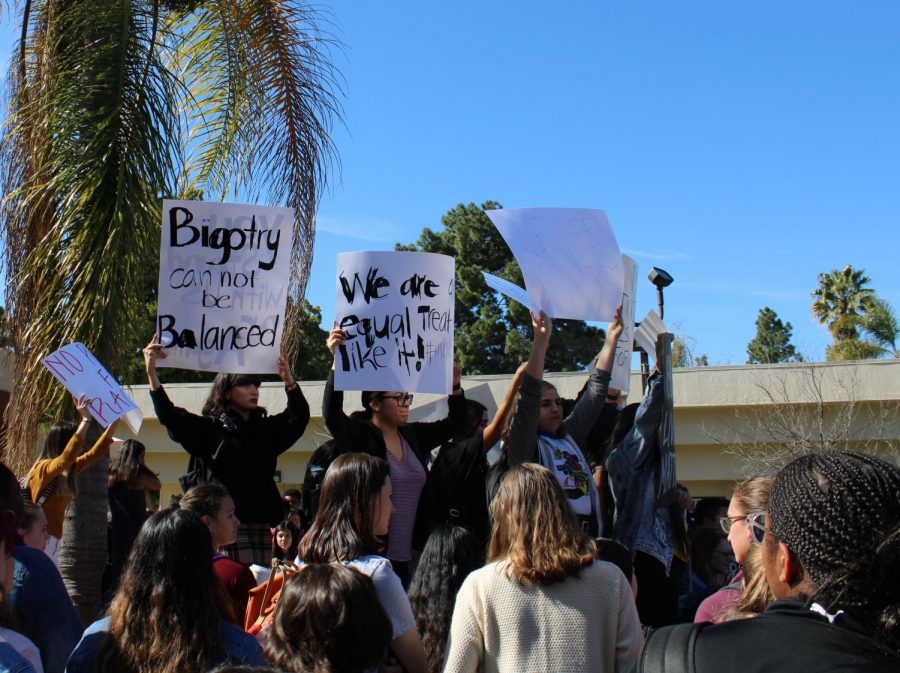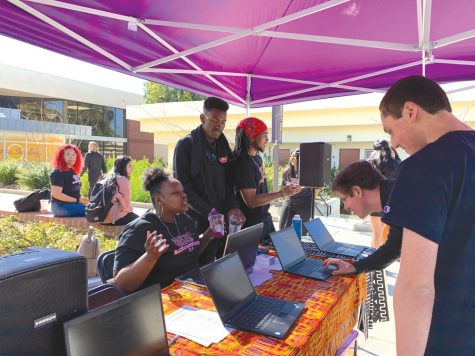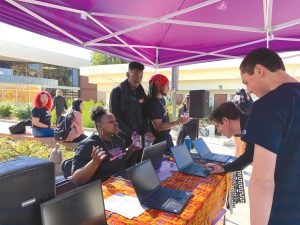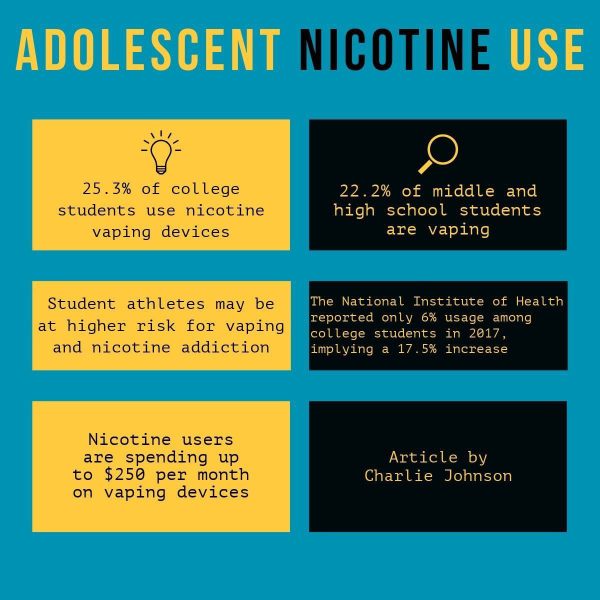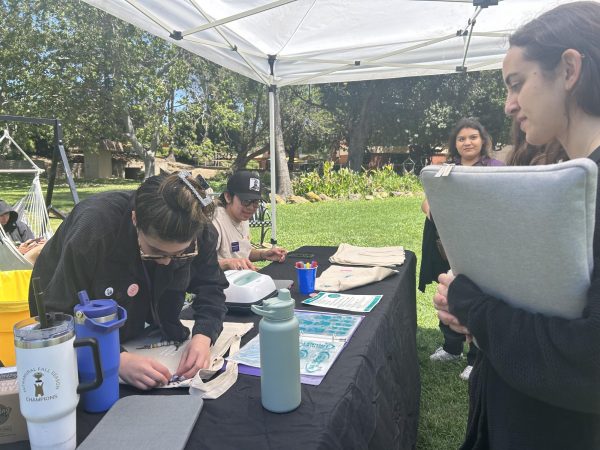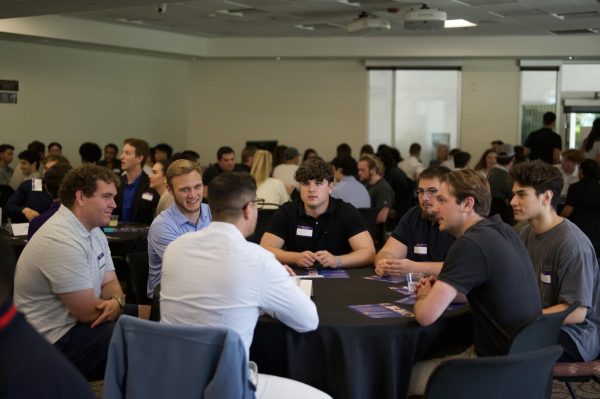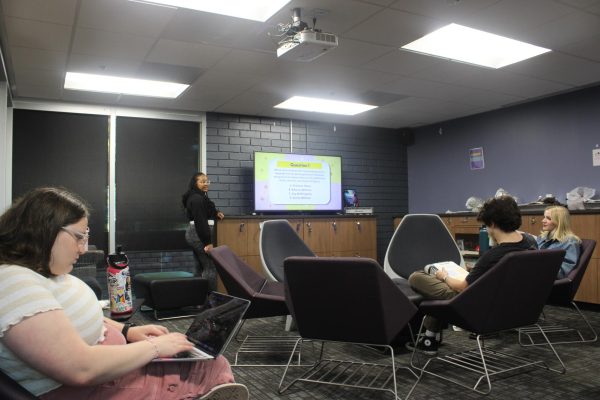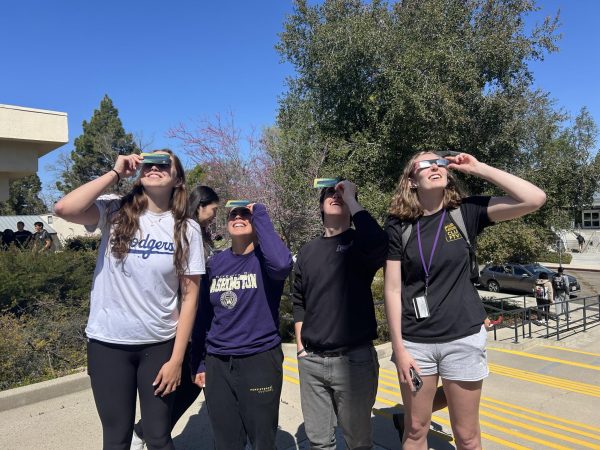Racism at Cal Lutheran: Students of Color tell their stories
Isabella Breda - Editor in Chief
Pictured: Hundreds of California Lutheran University students participated in a walkout Feb. 12 to call attention to the lack of action they feel administration has taken in response to two allegedly racist incidents that surfaced in early February.
October 14, 2020
Last spring, after two separate racist actions were revealed in an email from former President Chris Kimball, many students took a stand against the institutionalized racism that exists within higher education, and California Lutheran University specifically.
This article details the experiences of six students of color represented by pseudonyms. The editorial staff decided to use anonymous sourcing to tell stories that would otherwise not be reported.
Sarah
When Sarah was finalizing her college decision, Cal Lutheran invited her to attend InCLUsive, a program which gives admitted high school students the opportunity to visit campus and engage with students from “underrepresented” groups in higher education, according to the university website.
“I felt like the one thing they kept pushing was diversity… and me coming from like, a white majority school my whole life. I grew up in [a suburban neighborhood], I’ve already grown up being the one Black girl in the school my entire life,” Sarah said. “I really wanted to go somewhere where I feel that I was accepted, or at least seen.”
In 2018, Sarah, a first-year at the time, experienced racial bias at Cal Lutheran after she and her roommates got into a verbal argument. According to Sarah’s recount of the incident, one of her roommates tried to physically attack her, resulting in multiple roommate meetings with their hall’s Resident Assistants.
After Sarah moved into a new room, she said she began seeking therapy for the racial and physical trauma she experienced. Sarah said she spent that summer learning that what had happened to her wasn’t her fault.
“I was diagnosed with situational depression and I developed a lot of social anxiety. To be completely honest I didn’t even want to go back to [Cal Lutheran]. I couldn’t even leave my bed,” Sarah said. “I learned that what happened to me wasn’t my fault. It’s not my fault that I’m Black.”
Sarah returned to campus for her sophomore year, believing she could make a bigger impact by becoming involved with cultural clubs and other programs on campus that support diversity and inclusion initiatives, she said.
During Sarah’s second year on campus, she said she once again experienced racism from her new roommates.
“There were times when I would ask to shower before everyone else because as a Black woman it takes longer to do our hair, so I wanted to ask just to be polite and give them a heads up,” Sarah said. “They would get really upset and make me shower after them so I would have to stay up until 2 or 3 a.m. just to finish my hair even though I would purposefully ask beforehand.”
Sarah said her roommates eventually asked for an RA meeting where they alleged that she had been “hostile” toward them.
“One time I was coming home from class and I heard them talking shit about me and saying things like ‘we should put the trash on her bed and her dirty dishes’ so I walked in upset but didn’t say a word and walked to my room,” Sarah said.
After this incident an RA reached out to schedule a meeting with Sarah and her roommates.
“I tried explaining to [the RA] what happened to me the previous year and let him know that I suffered from anxiety and already felt isolated,” Sarah said. “I didn’t want to feel alone in this and I wanted to come to a resolution.”
Sarah said one day she came home from class and the RA and her roommates were waiting for her in the living room.
“They left me a seat right in the middle, after I had told the RA I didn’t want to feel isolated and what happened to me before,” Sarah said.
Sarah said during the meeting her roommates told the RA Sarah was being hostile towards them, however, they couldn’t give the RA examples of times she was hostile.
Sarah said they did end up revealing to the RA that they had problems with her and didn’t like her because she was “different.”
“That’s when I knew it was a race thing and straight up racism. The RA tried to ask them what they meant by ‘different’ and all they could say was that I was ‘different’ and had a ‘different lifestyle’ from them,” Sarah said. “At one point the RA said to my roommates, I know [Sarah] comes off as more aggressive, and I was so confused. I felt like he was trying to paint me as the angry Black woman. I’m not an aggressive person at all, it was clearly an assumption based off of my race.”
After this incident, Sarah said she was again moved to a new roommate group.
Bryanna
After being invited to InCLUsive, Bryanna, who was undocumented at the time, picked Cal Lutheran.
Bryanna said she wanted to go to a university that would provide a safe space to continue her education.
“I really was looking for a school where I knew I could be protected because I didn’t have DACA, I had nothing to protect me,” Bryanna said.
But during Bryanna’s first year at Cal Lutheran, she experienced racism from a staff member in front of other students.
“There were tables on the Spine. I think it was an involvement fair and there was a lady in one of the tents … getting signatures. I don’t know if it was a petition or something like that, but she was getting signatures,” Bryanna said. “White students, they went up and they signed, you know, signed whatever [it was] and when I went up, she was like, you have to be a citizen to sign this. At that time, I was undocumented.”
Bryanna said she didn’t think much of the interaction at first, but then realized she did not know this staff member and there was no way for this person to have known she was undocumented.
“Why are you assuming, like, are you just telling all your Latino students this, and so I didn’t get mad,” Bryanna said. “I was like, I thought this place was supposed to support undocumented students, that’s not okay for them to just assume that I’m not a citizen.”
Bryanna said since this incident, the biggest threat to students of color has been the lack of transparency in Cal Lutheran’s response to the two racist incidents revealed in the spring.
“If there’s no transparency, you’re hiding this racial incident and not telling [the students] about it. How are we supposed to feel safe, you know. You could be hiding a lot of that stuff,” Sarah said. “How am [I] as a Latina woman supposed to be safe on this campus, you know.”
Steven
Steven, a senior at Cal Lutheran said some of the racism he has experienced has come from Conejo Valley residents.
One day Steven was writing music outside of Grace Hall when an individual walking through campus assumed he was trespassing.
“She called Campus Safety, and I tried to let her know that I wasn’t even 50 feet in front of her front lawn or the front door [of her home]. So I tried to let her know that… I’m just writing music. Like, you don’t have to worry about me, I’m just walking around, you know,” Steven said.
“She still profiled, and then called Campus Safety,” Steven said.
Steven said Campus Safety came to ask what he was doing and he had to reiterate that he was just writing music.
“It was just a situation where, honestly, I’ve never dealt with that, because I [write music outside] all the time and I didn’t realize that it was going to go that far with her,” Steven said. “But, of course, people have their own inclinations and things that they feel are important in it. As far as their safety concern, I had on a CLU shirt.”
Kelly
Kelly, who identifies as Indigenous, said she experienced racism in class.
During a class discussion on climate justice, Kelly self-identified to the class as Indigenous.
After Kelly self-identified, she said a white student asked why her ancestors didn’t just assimilate.
“He proceeded to say things that had hit me to the core, because my ancestors are Indigenous people, and they have been inhabiting this land for millennia,” Kelly said. “He kept saying words like, oh native people should just assimilate because they’re the inferior people, and you know social Darwinism held some ground, and he basically implicitly said that native people don’t matter in regards to climate, or racial justice and prior to his comment I explicitly stated to the class, I am an Indigenous descent, my nation is Pascua Yaqui.”
Kelly said she recalls that a few other classmates began to chime in and agree with the student’s comments about assimilation.
“Hopi and Navajo and Apache, we go through so much marginalization, and I say we, because we are all Indigenous children … on this side of the world, and he just didn’t care. His fellow classmates at the back of his row said things like, oh, they don’t they just don’t understand what you’re saying,” Kelly said. “You’re actively attacking people’s existence and trying to force them to validate why you should treat them as human beings.”
Kelly said her professor did the best they could to dismantle the tension in the class after these statements were made. However, Kelly was still shaken up.
“I was on the verge of tears because I was just told to my face that I didn’t matter. My ancestors didn’t matter,” Kelly said.
Jane
Jane, a junior, said she has seen racial bias within her classes.
Recently, in a class discussion about how philosophy relates to microaggressions, Jane said many students began to come up with ideas they felt would fit the narrative.
“I feel like along the way, a lot of people lost the true definition in essence of what the word, [microaggression] means,” she said.
Jane added that at Cal Lutheran, she often feels like it’s hard to correct other students without them feeling like she’s attacking them.
“Going to a school that is predominantly white like Cal Lutheran, sometimes it’s hard to bring correction in those situations without people feeling like you’re attacking them or attacking their character,” Jane said.
Cheryl
Cheryl, a member of an affinity group on campus, said she has repeatedly heard her peers describe stories of microaggressions in the classroom.
“It’s a very common microaggression of like, a white professor, or a non [Person of Color] professor, to be talking about something in the Black community, and be like, oh, so what’s your opinion, just because you’re Black,” Cheryl said. “It doesn’t have to be something super brash or big, that makes the difference, but it’s a lot of those like microaggressions that it’s like, okay, you know, watch the word you’re saying, use different words and don’t approach the situation in that manner.”
Cheryl said she felt uncomfortable being on campus when the racist incidents occurred in the spring and she did not think the response from university administration was visible enough.
“My initial reaction was just like, wow, this sucks,” Cheryl said. “I don’t want to be here.”
This article was reviewed by Sharon Docter, a professor of communication at Cal Lutheran and media law expert.
This article was updated Oct. 14 at 10:30 a.m. to clarify that Cheryl said she believed the response from university administration wasn’t visible enough. A previous version stated that the response from university administration wasn’t visible enough.

